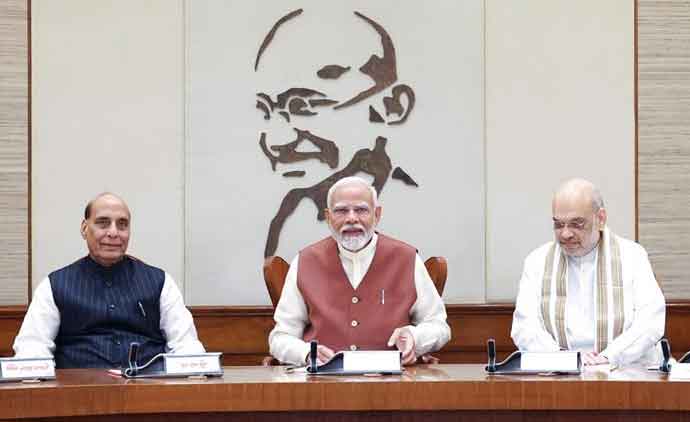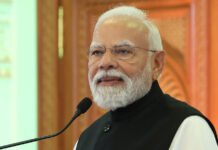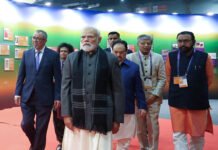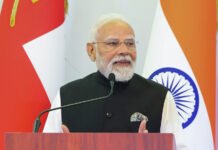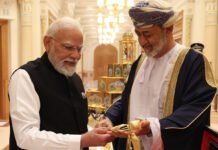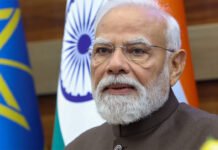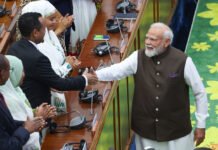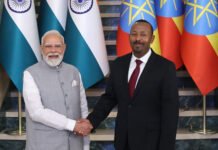INVC NEWS New Delhi — The Operation Sindoor has marked a turning point in India’s ongoing battle against cross-border terrorism. Within just 25 minutes, the Indian Army executed a precise and high-impact assault on terrorist infrastructure, eliminating nine key training centers, including the operational headquarters of Lashkar-e-Taiba and Jaish-e-Mohammed. These strikes dealt a severe blow to terror operations based in Pakistan and Pakistan-occupied Jammu and Kashmir (PoJK), signaling a bold escalation in India’s counter-terrorism doctrine.
Following the operation, the central government has scheduled an all-party meeting at 11 AM today, led by Defense Minister Rajnath Singh, to share critical updates, retaliation outcomes, and future strategic plans with opposition leaders.
Precision Strike: Terror Camps Reduced to Rubble
Launched with seamless coordination between intelligence agencies and the Indian Armed Forces, Operation Sindoor neutralized nine major terror camps in under half an hour. The targets were selected based on confirmed intelligence inputs, ensuring maximum impact with minimal risk to Indian forces.
Sources within the defense establishment confirmed that:
Multiple high-value terrorist operatives were eliminated.
Logistical networks and communication hubs used for infiltration into Indian territory were dismantled.
The mission was executed without any casualties on the Indian side.
High-Level Political Briefing: Uniting for National Security
With tensions rising across the western front, the government has taken the proactive step of inviting opposition leaders for a classified briefing. Chaired by Defense Minister Rajnath Singh, and attended by Home Minister Amit Shah and Parliamentary Affairs Minister Kiren Rijiju, the meeting aims to:
Present the results of Operation Sindoor.
Discuss India’s next phase of defense readiness.
Ensure cross-party alignment on matters of national security.
Opposition Demands Prime Minister’s Participation
Congress leader Jairam Ramesh voiced the party’s expectation that Prime Minister Narendra Modi should attend the meeting, stating that his presence would reinforce the seriousness of the issue. While the Prime Minister did not attend the previous meeting on April 24, opposition leaders including Mallikarjun Kharge and Rahul Gandhi are confirmed participants today.
This engagement seeks to foster a unified national message that India’s approach to terrorism is unwavering, regardless of political differences.
Congress Suspends All Programs in Support of Armed Forces
Demonstrating solidarity with the nation and the armed forces, the Congress party has announced the suspension of all scheduled activities, including the ‘Samvidhan Bachao Rallies’. A formal statement expressed unconditional support for the armed forces, emphasizing the need to set aside political agendas during times of national crisis.
This move has been widely praised as a responsible gesture, reinforcing a nation-first approach in times of escalating threats.
Prime Minister Cancels Overseas Visit Amid Security Prioritization
Originally slated to visit Norway, Croatia, and the Netherlands from May 13 to 17, Prime Minister Narendra Modi has postponed the diplomatic tour, citing national security as the government’s top priority. These planned visits were aimed at boosting defense, energy, and trade ties with European allies, but have been deferred to allow the Prime Minister to oversee ongoing national security operations.
His decision underlines the government’s full commitment to domestic stability and military oversight during a period of heightened alert.
Military Vigilance Intensifies Along the LoC
Following the cross-border operation, the Indian Army remains on maximum alert across the Line of Control. Army Chief General Upendra Dwivedi is in direct communication with ground-level commanders, overseeing troop readiness and monitoring possible ceasefire violations or retaliatory action from the Pakistani side.
Security measures in effect include:
Increased aerial surveillance and drone monitoring
Deployment of quick reaction teams (QRTs) at strategic locations
Enhanced communication interception systems to preempt infiltration attempts
Defense officials stated that any provocation by Pakistan will be met with immediate and proportionate force.
Future Roadmap: A Multi-Layered National Defense Strategy
Key points expected to be discussed during the all-party meeting include:
A comprehensive review of India’s border defense infrastructure
Expanded counter-insurgency operations across PoJK
International outreach to expose Pakistan’s support for terrorism
India is also preparing to submit dossiers of actionable intelligence to international bodies such as the United Nations, FATF, and global counter-terror forums to isolate Pakistan diplomatically and economically for its persistent backing of terror groups.
Nationwide Response: Unity, Resilience, and Patriotism
Citizens across India have responded with a surge of patriotism and support. Tributes have poured in on social media, while communities have organized candlelight vigils and prayer ceremonies for the armed forces. Schools, civic bodies, and businesses have observed moments of silence in solidarity with the military.
State governments have also increased alert levels in major cities, airports, railway stations, and sensitive installations, ensuring a coordinated security environment.
India’s Message to the World: A New Red Line Has Been Drawn
Operation Sindoor is not just a tactical military success—it is a strategic signal to terror networks and their backers that India will not tolerate attacks on its sovereignty. This operation affirms that retaliation will be swift, surgical, and devastating.
Today’s all-party meeting is a crucial step toward building a national consensus on security policies and reinforcing India’s position on the world stage as a nation that leads with both strength and restraint.
The message is loud and clear: India will not back down. India will defend its people. And India will dismantle terror at its roots—no matter where it hides.

